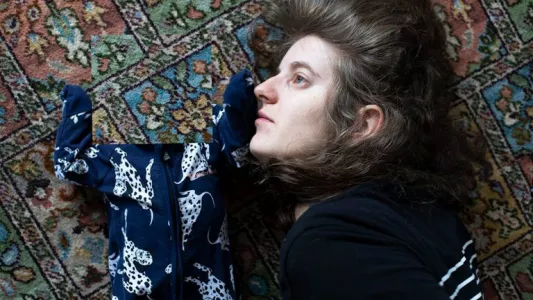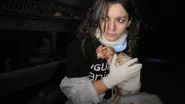The prevalence and everydayness of motherhood should make it one of the most mundane, and banal of events. The commonality of the whole thing should make it unremarkable in both experience and documentation. However unremarkable it should be, the intense newness and unfamiliarity of motherhood has an impact that few people can prepare for. Documentation of these heady days comes in many guises, from the traditional studio portraits, to the ‘throwaway’ shots for Instagram stories. The relationship between motherhood and photography have been widely discussed, unsurprisingly penned mainly by female writers and academics. As an established female photographer entering into motherhood, the question of how it will impact an existing practice will be most likely considered. The compulsion to document your motherhood journey can be a strong desire but how this is conducted can be tricky to navigate. Beyond the contemporary family album of social media and after making a choice of whether or not to show the face of their chubby and innocent newborn on the internet, where does your experience of motherhood blur into a project? Or as an equally difficult choice, you choose to ignore it entirely? As a woman, these decisions will be scrutinised regardless in some way or another, either publicly or privately. There is an intensity in motherhood to share the honesty or rawness of the experience with others- whether this is as intended as a warning, or as a tribe-like protection is unknown. The mother may be in limbo, given that they may want to remain as private as possible in a vulnerable time, yet want everyone to know exactly what they are going through, and possess the tools and knowledge to aesthetically articulate this. There is no doubt motherhood comes to the system as a shock for most, and turning to the familiarity of photographing the experience can potentially ease this new reality that photographers find themselves in. Connecting two seemingly unconnectable worlds is undoubtedly a consideration of the mother- photographer. Doing so may provide the new role with a purpose the mother- photographer recognises as her own.
Jocelyn Allen’s ongoing project
documents her experience of early motherhood. Allen documented her pregnancy in her
and has continued this style beyond childbirth. The pale colour palette, mostly dark clothing and expressionless faces lends itself well to visually representing the first months of parenthood, where most things are entirely turned upside down. Her reasoning for continuing documentation of early motherhood is listed on her blog,
: “I wanted to document early motherhood whilst being as honest as possible about my experiences”. The photographs are indeed honest, raw and intimate but also exist as extremely familiar scenes to a mother who has also been through the sleep deprivation, the breast pumps and tearing up over seemingly minor occurrences.
There is a feeling of solidarity when viewing the photographs, a safeness as a female that is both comforting and sensitive. The question of who you are photographing your own journey into parenting for becomes more complex as a photographer choosing to document into motherhood. A non-photographer captures in maternity to predominantly share or to document new and exciting moments. This sentiment is shared with the mother-photographer, but the blur between work, creativity, skill, privacy and the new role comes into play. The honesty that can be depicted through art photography such as Allen’s that challenges the ‘smiling mother’ mentality should be seen as a positive act towards contributing to a more truthful depiction of motherhood. Allen’s main body of work contains self-portraiture, so turning her camera inward at such a pivotal time in her life doesn’t strike as an unnatural move. Allen’s practice is diaristic, a contemporary family album punctuated with detailed accompanying text in the way of long, almost undecipherable hashtags displaying an honest vulnerability. Allen is open with her privacy choices for her daughter, B, and has ensured that hiding her face is very much part of the work itself. Laying on a carpet with her daughter, Allen has digitally manipulated part of the carpet out onto the face of baby B, with humorous but visually pleasing outcomes.

The contextual and technical knowledge held by a mother-photographer may lay precedent for their work to be viewed differently to that of an amateur, but this difference may only be apparent in the platform on which work is presented or the consistent aesthetic of a narrative bound together by ongoing concept. The real discussion point that has arisen here is not about the photographer choosing to turn her camera inward but the representation of motherhood in society as a whole. The lack of honesty or widespread diversity of messages about real motherhood allow us the space to critique mother photographers for filling that gap themselves. Photographing a journey into motherhood does not differ than photographing any other autobiographical facet of life, but like most things concerning females, it begs critique. Jocelyn Allen has successfully shown the delicate balance that combining photography and early maternal experience can strike, with beautiful results. Nonetheless, this hasn’t been without obstacles as she states in a recent blog post. Interwoven into the caption hashtags, Allen mentions loneliness and wanting to retain some of her old identity- a common issue found in working mothers whom for motherhood has been a significant change in lifestyle. Turning the camera inward on this experience could assist in gaining clarity and rationalise the experience of becoming a mother, in a familiar and comforting way. Motherhood should seem one of the most mundane and banal of events in any person’s life, but it exists as anything but indescribable at times. Continuing to document personal experiences of motherhood helps others make sense of it visually but more importantly, continues to build much needed discourse for mothers and female photographers- just as Jocelyn Allen has begun to do so poetically.




